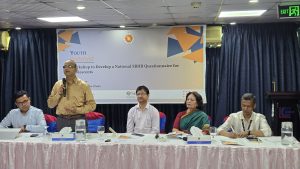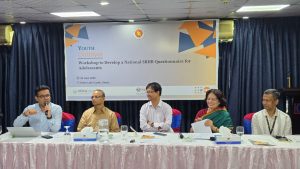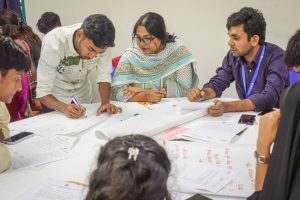 As part of Youth Catalyst, a project of UNFPA, funded by SIDA and implemented by SERAC-Bangladesh, the Workshop to Develop a National SRHR Questionnaire for Adolescents was held in Dhaka to develop a National SRHR Questionnaire for Adolescents. This workshop marked the beginning of a youth-centered, inclusive, and evidence-driven effort to improve sexual and reproductive health and rights (SRHR) for adolescents in Bangladesh—especially those from climate-vulnerable and marginalized communities.
As part of Youth Catalyst, a project of UNFPA, funded by SIDA and implemented by SERAC-Bangladesh, the Workshop to Develop a National SRHR Questionnaire for Adolescents was held in Dhaka to develop a National SRHR Questionnaire for Adolescents. This workshop marked the beginning of a youth-centered, inclusive, and evidence-driven effort to improve sexual and reproductive health and rights (SRHR) for adolescents in Bangladesh—especially those from climate-vulnerable and marginalized communities.
The workshop brought together over 50 participants, including youth leaders, SRHR experts, public health researchers, disability rights advocates, and representatives from various government ministries and UN agencies. The goal was to co-create a standardized, context-sensitive questionnaire that reflects the realities, challenges, and needs of adolescents across Bangladesh.
Opening Remarks and Key Contributions

The event was inaugurated by SM Shaikat, Executive Director of SERAC-Bangladesh, who emphasized the need for participatory tools to inform youth-focused health services and policies. “Without understanding young people’s lived experiences,especially those in vulnerable settings, we cannot expect to close the gaps in our systems,” he stated.
The workshop was honored by the presence of Dr. Vibhavendra Singh Raghuvanshi, Chief of Health, UNFPA Bangladesh, and Dr. Halida Hanum Akhter, Member of the Women’s Reform Commission. Expert insights were also shared by Professor Dr. Iqbal Kabir, Director, CCHPU, MoHFW; Dr. Abu Sayed Mohammad Hasan, SRH Program Specialist, UNFPA Bangladesh; Dr. Belal Uddin Ahmed, Assistant Director, MCH unit, DGFP.
Resource persons including Ms. Backey Tripura, Technical Advisor for Safeguarding and Gender Mainstreaming at CARITAS Bangladesh, and Ms. Fariya Rahman, Research Investigator at icddr,b also contributed significantly to the workshop by guiding group discussions and integrating gender and research perspectives into the session.
Workshop Structure and Focus

The workshop was designed around four thematic group discussions, where participants explored:
Each group co-developed a set of questions based on real-life barriers faced by adolescents, particularly those living in slums, disaster-prone areas (char and haor), or engaged in child labor and sex work. A unique feature of the session was ensuring adolescents with disabilities and ethnic minorities were fully represented.
The participatory methodology facilitated dynamic discussion, enabling young people to speak openly about their experiences while professionals and government officials listened and contributed ideas for policy and service improvements.
The questions generated from this workshop will be used in national, divisional, and district-level consultations to gather broader insights. Ultimately, these will inform the development of a National White Paper to guide adolescent health programs and climate-resilient health policy.
This workshop reaffirmed that adolescents are not just service recipients, they are agents of change, capable of shaping the very systems meant to serve them.